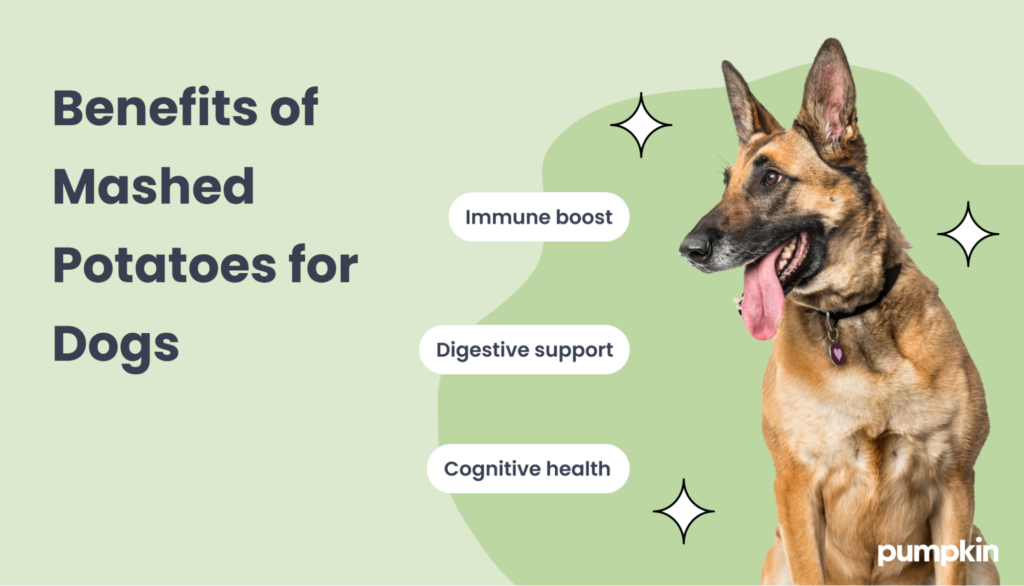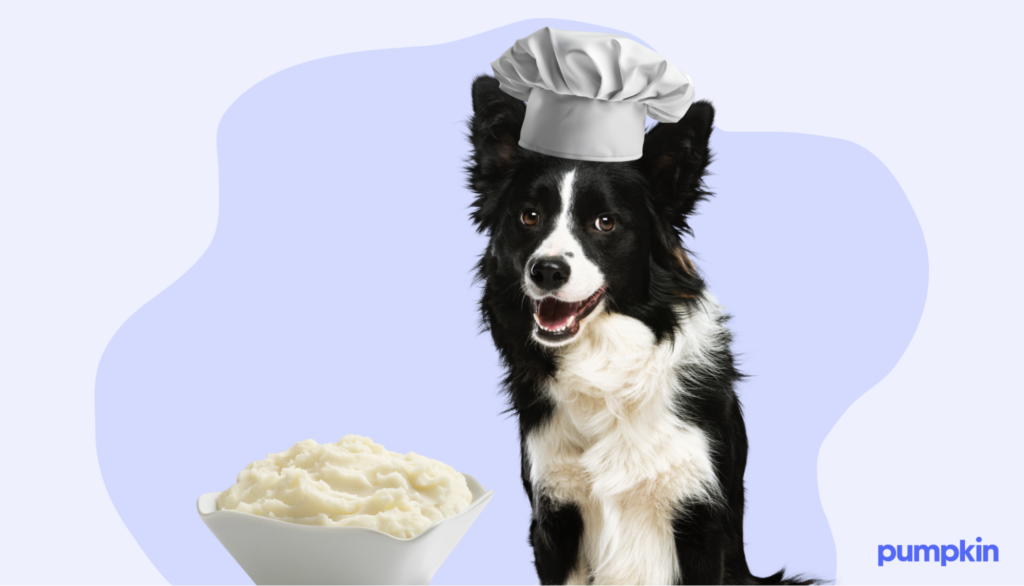Key Points:
- Yes, dogs can eat plain mashed potatoes in moderation, but avoid seasonings and additives.
- Potatoes provide vitamin C, vitamin B6, and iron, which are beneficial for dogs.
- Overfeeding your dog mashed potatoes can lead to weight gain, and raw potatoes can cause solanine poisoning.
Can dogs eat mashed potatoes? It’s a common question around the holidays, when many a hungry dog decides to take advantage of an unattended dinner table and help themselves to a little potato snack — and given the chance, a not-so-little snack. Even if your pup is too well-behaved to ever dream of sneaking food behind your back, you may be wondering if you can share mashed potatoes under the table. Well, the answer is — maybe!
While potatoes are generally safe for your dog, mashed potatoes require a closer look. Without all the added salt and butter, mashed potatoes are fine for most dogs, in moderation.
But before you start scooping this fluffy goodness into your dog’s dinner bowl, make sure you know the dos and don’ts of serving mashed potatoes to your pup.
Potatoes can be a healthy treat for dogs
Both potatoes and mashed potatoes have some nutritional benefits. Plain, unseasoned mashed potatoes contain healthy vitamins, minerals, and nutrients such as:
- Vitamin B6
- Vitamin A
- Vitamin C
- Antioxidants
- Magnesium
- Potassium
- Iron
- Calcium
- Fiber

The vitamin C in potatoes supports your dog’s immune system. Minerals like magnesium and potassium help protect heart health, bone growth, cell growth, kidney function, and metabolism. Potatoes are also rich in antioxidants, which protect cells from damage and the brain from oxidative stress.
In addition, high-fiber foods like potatoes keep your dog’s digestive tract moving smoothly, which is why potatoes are a common home remedy for doggy diarrhea. Fiber means easier and more regular bowel movements, which is a win for everyone.
My dog accidentally ate mashed potatoes, now what?
Did your dog help themselves to a generous serving of mashed potatoes after everyone got up from the Thanksgiving table? Then you may be wondering what you should do.
Fortunately, potatoes aren’t toxic to dogs, but don’t be surprised if your sneaky snacker throws up or has a stomach ache. The salt and butter we add to mashed potatoes aren’t healthy for dogs, and so you’ll want to watch your pup for signs of digestive upset. However, if your mashed potatoes recipe calls for garlic, onions, chives, or similar spices, you may need to contact the Pet Poison Helpline. Read on to learn about the dangers of these ingredients.
Risks of feeding your dog mashed potatoes
Although most dogs can enjoy mashed potatoes safely, there are some risks for pups with certain health conditions, like diabetes or obesity. In addition, many of our favorite mashed potato fixings are very unhealthy, and even toxic, for dogs.
Beware salt, onions, butter, and garlic
Unfortunately, all the good stuff we like to add to mashed potatoes can make them very dangerous for dogs. That’s why there’s no simple answer to the question, “Can dogs eat mashed potatoes?”
Onions and garlic are both extremely toxic to our pups. Both of these plants can poison dogs in sufficient quantities. So, if your mashed potatoes recipe calls for onions or garlic, either fresh, cooked, or powdered, you shouldn’t share this Thanksgiving staple with your pup. In particular, even a small amount of garlic can cause garlic toxicity.
If your dog has consumed onions or garlic, contact your veterinarian and watch out for signs of poisoning such as:
- Lethargy
- Decreased stamina or even fainting after or during exercise
- Loss of appetite
- Pale gums
- Elevated heart rate or respiratory rates (rapid breathing)
- Discolored urine
- Yellow eyes, skin, or gums
Lastly, too much salt in a dog’s diet can cause a variety of health problems.
Pet Pro Tip: If you have a dog that is prone to ‘snacksidents’ – you should consider getting a dog insurance plan as soon as possible. It can help you afford the best care in the future by covering eligible vet bills for digestive illnesses, toxic ingestion, and more.
Blood sugar spike
Potatoes are high in carbohydrates. This can cause blood sugar spikes, which can be deadly for dogs with diabetes because they can’t process large amounts of carbs or sugar in their diets.
So, feeding them potatoes or mashed potatoes may be risky. Too much human food can cause increased thirst, urination, and lethargy in the short term, and pancreatitis and kidney damage in the long run.
Obesity
Overfeeding carbs can lead to weight gain and turn your lean dog into an overweight pup. Excess carbs that aren’t used for energy are stored as fat and contribute to those extra pounds, which can then lead to a whole lot of other problems like joint and heart issues and a shortened lifespan.
The rule of thumb is to keep treats in check. The majority of your dog’s daily calories (90%) should come from a regular dog food diet, with the remaining 10% coming from treats.
Solanine poisoning
While cooked, unseasoned mashed potatoes are fine for dogs, raw potatoes aren’t. As a member of the nightshade family, potatoes contain solanine, which is toxic to humans and animals. The cooking process reduces the solanine in potatoes, making it safer for you and your dog.
High levels of solanine are also found in green potato skin, so make sure your pup steers clear of any green bits on those potatoes. If your dog accidentally eats raw potatoes or green potato skin, call or visit your vet right away.
How to prepare mashed potatoes for your dog
Mashed potatoes are a yummy snack for your dog if they are prepared correctly. This means no butter, gravy, fats, salts, or seasonings. Frozen or dehydrated mashed potatoes are also safe for your dog to consume.

Avoid adding any garlic, onions, or chives, as they can cause red blood cell damage and lead to anemia. Garlic and onion powder are also a big no because the toxins are even more concentrated.
Keep in mind that some dogs are lactose intolerant, so adding any dairy products like milk or sour cream may upset their tummy. If you want to make creamy mashed potatoes for your dog, use goat milk for a more digestible option.
If you like to add lots of butter and salt to your mashed potatoes — and who doesn’t? — then you can prepare a small portion of plain, unseasoned potatoes to add to your dog’s kibble on holidays like Thanksgiving and Christmas. You can add mashed potatoes as a topper to their regular food, or better yet, mix it with other healthy veggies. You can even stuff some mash inside a Kong toy instead of peanut butter.
Alternatives to mashed potatoes
Want to mix things up a bit? Here are some other yummy and healthy options that can be mashed or pureed for your pup:
- Sweet potato: Packed with vitamins, minerals, and antioxidants, this is another dog-safe holiday staple.
- Pumpkin: A fantastic source of fiber and vitamins, and most dogs love the taste.
- Carrot and parsnip: Veggies with sweet flavors and plenty of vitamins and antioxidants.
- Butternut squash: Another winner full of vitamins A and C, fiber, and potassium.
- Cauliflower: A great low-carb option that can also be served mashed.
These alternatives have a lower glycemic index than regular white potatoes, meaning they cause fewer blood sugar spikes. They’re also rich in vitamins and antioxidants to keep your pup feeling great even after a feast.
The last word: Mashed potatoes for dogs
Mashed potatoes can be a great way to share a little bit of the holiday spirit with your dog.
Just remember to save the family recipe for yourself and keep your dog’s portion free of extra ingredients and seasonings. Go ahead and make it a holiday tradition that both you and your dog will look forward to year after year.
Finally, if you have an adventurous snacker in your home, then you may want to consider investing in pet insurance. Pumpkin dog insurance plans can help cover eligible vet bills caused by unexpected accidents and illnesses in the future.
FAQs
- https://fdc.nal.usda.gov/fdc-app.html#/food-details/169768/nutrients
- https://mypetnutritionist.com/post/5-benefits-of-vitamin-c-for-your-dog/
- https://pmc.ncbi.nlm.nih.gov/articles/PMC2761532/
- https://www.akc.org/expert-advice/nutrition/benefits-high-fiber-dog-foods/
- https://elpasoanimalhospital.com/little-organ-big-problem-pancreatitis-in-pets/
- https://www.akc.org/expert-advice/nutrition/how-many-treats-can-dog-have/
- https://firstvet.com/us/articles/can-i-give-my-dog-goats-milk#:~:text=Ideal%20for%20Lactose%20Intolerant%20Dogs,causing%20gastrointestinal%20problems%20in%20dogs
- https://vcahospitals.com/know-your-pet/feeding-the-canine-cancer-patient#:~:text=Tumor%20cells%20love%20carbohydrates.,may%20benefit%20dogs%20with%20cancer.%22
- https://www.becopets.com/blogs/news/what-to-feed-dogs-with-diarrhoea-7-foods-to-try#:~:text=Potatoes%20%E2%80%93%20in%20whichever%20form%20they,firms%20up%20a%20dog's%20stool
- https://www.fda.gov/animal-veterinary/outbreaks-and-advisories/fda-investigation-potential-link-between-certain-diets-and-canine-dilated-cardiomyopathy
- https://www.avma.org/javma-news/2021-01-01/fda-urges-collaboration-dilated-cardiomyopathy-afflicts-more-dogs




